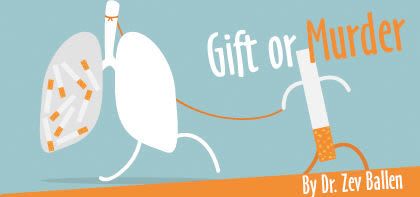
Gift or Murder?
One is not permitted to destroy life because life belongs to G-d. G-d entrusts us with life, but life doesn't belong to us to destroy it with a nicotine dependence...

Rabbi Twinkle is an exceedingly friendly person. He smiles and greets everyone who comes into his synagogue with a handshake and a good word. His friendliness combined with his genius in Talmudic logic and knowledge of the Jewish Codes of Law, have made him a very popular figure in yeshiva circles. Rabbi Twinkle has established his own yeshiva and even prominent Rabbis attend his lectures.
Considering his high level of Torah scholarship and community service, there has been an aspect to Rabbi Twinkle that didn’t make sense to me – at least to my American mentality. The Rabbi doesn’t hide the fact that he’s a smoker. The Rabbi can routinely be seen, by the youth of his community, puffing away in front of the synagogue while on break from his learning – a practice that his own teenage son has begun to emulate.
But the straw the broke the proverbial camel’s back…what I personally witnessed the Rabbi do on Purim night, was so horrific that part of me still refuses to believe my own eyes.
On Purim night, not only did Rabbi Twinkle smoke inside the synagogue exposing many people to his second hand smoke (a known carcinogen) but he proceeded to hand out cigarettes to a long line of eager children who couldn’t wait to receive a cigarette from the Rav!
A friend of mine told me, “Zev, you’re American. The Rav is an Israeli. You don’t understand. Smoking is part of the Israeli culture and mindset. He grew up in a culture where on Purim, parents give out cigarettes to their  children. They don’t know how bad it is.”
children. They don’t know how bad it is.”
I understood my friend, in part. Perhaps the Rav was not privy to the scientific literature on smoking – but I thought that he should certainly be familiar with what the Torah says about smoking. I wondered what does Jewish law have to say about smoking? Is it permissible or forbidden?
I spoke with Rabbi Twinkle and with another Torah scholar who also smokes. They both told me that cigarette smoking was permitted under Jewish law. They defended their right to smoke based on a controversial legal ruling that Rabbi Moshe Feinstein wrote in 1981 (Iggrot CM ll:76; June 10, 1981). In this ruling, although Rabbi Feinstein strongly discourages smoking, he writes that since many people who smoke do not suffer any health problems, and most who smoke are not endangered by it, one may say that smoking is permitted because “the Lord watches the simple.” Unfortunately due to Rabbi Feinstein’s authority, many Rabbis today are still loathe to prohibit smoking despite the undeniably clear evidence that smoking is deadly to one’s health.
Let’s consider the scientific facts about cigarette smoking according to the American Lung Association:
Cigarette smoking has been identified as the most important source of preventable morbidity (disease and illness) and premature mortality (death) worldwide. Smoking-related diseases claim an estimated 443,000 American lives each year, including those affected indirectly, such as babies born prematurely due to prenatal maternal smoking and victims of “secondhand” exposure to tobacco’s carcinogens. Smoking cost the United States over $193 billion in 2004, including $97 billion in lost productivity and $96 billion in direct health care expenditures, or an average of $4,260 per adult smoker.
Cigarette smoke contains over 7,000 chemicals, 69 of which are known to cause cancer. Smoking is directly responsible for approximately 90 percent of lung cancer deaths and approximately 80-90 percent of COPD (emphysema and chronic bronchitis) deaths.
About 8.6 million people in the U.S. have at least one serious illness caused by smoking. That means that for every person who dies of a smoking-related disease, there are 20 more people who suffer from at least one serious illness associated with smoking.
Among current smokers, chronic lung disease accounts for 73 percent of smoking-related conditions. Even among smokers who have quit chronic lung disease accounts for 50 percent of smoking-related conditions.
The list of diseases caused by smoking includes chronic obstructive pulmonary disease (COPD, including chronic bronchitis and emphysema), coronary heart disease, stroke, abdominal aortic aneurysm, acute myeloid leukemia, cataract, pneumonia, periodontitis, and bladder, esophageal, laryngeal, lung, oral, throat, cervical, kidney, stomach, and pancreatic cancers. Smoking is also a major factor in a variety of other conditions and disorders, including slowed healing of wounds, infertility, and peptic ulcer disease.
Smokers die significantly earlier than nonsmokers: 13.2 years for men and 14.5 years for women.
Smoking in pregnancy accounts for an estimated 20 to 30 percent of low-birth weight babies, up to 14 percent of preterm deliveries, and some 10 percent of all infant deaths. Even apparently healthy, full-term babies of smokers have been found to be born with narrowed airways and reduced lung function.
In 2005, 10.7 percent of all women smoked during pregnancy, down almost 45 percent from 1990.
Neonatal health-care costs attributable to maternal smoking in the U.S. have been estimated at $366 million per year, or $704 per maternal smoker.
In 2009, an estimated 46.6 million, or 20.6% of adults (aged 18+) were current smokers. The annual prevalence of smoking declined more than 50 percent between 1965 and 2009.
Secondhand smoke involuntarily inhaled by nonsmokers from other people’s cigarettes is classified by the U.S. Environmental Protection Agency as a known human (Group A) carcinogen, responsible for approximately 3,400 lung cancer deaths and 46,000 heart disease deaths in adult nonsmokers annually in the United States.
Smoking by parents is associated with a wide range of adverse effects in their children, including exacerbation of asthma, increased frequency of colds and ear infections, and sudden infant death syndrome. Secondhand smoke causes more than an estimated 202,000 asthma episodes, 790,000 physician visits for buildup of fluid in the middle ear (otitis media, or middle ear infection), and 430 sudden infant death syndrome (SIDS) cases each year.
In light of the overwhelming the scientific evidence of the widespread dangers of smoking, much of which didn’t exist in Rabbi Feinstein’s day, the Rabbinical Council of America issued aruling which was co-authored by one of Rabbi Feinstein’s son-in-laws. The ruling states that if Rabbi Feinstein were alive today, he would certainly reverse his opinion and prohibit smoking.
While learning at the yeshiva, I personally heard Rabbi Shalom Arush say that that the prohibition against smoking does not stem merely from the commandment to protect one’s health. It also stems from Torah prohibition against murder. The same logic that applies to the prohibition to murder others applies to murdering oneself. Smoking is a form of suicide because with every inhalation the smoker causes direct damage to his lungs and, in a sense, brings his own death a bit closer. If this is the case, such a person violates a severe negative commandment, “Thou shall not kill,” which is one of the Ten Commandments.
Many other people that I speak to, as a psychotherapist, justify their smoking with a specious form of emuna. They tell me that it’s up to G-d how long a person will live. So what difference does it make if they smoke? Actually this fatalistic attitude is the opposite of true emuna. Granted that the years of our lives may be pre-determined, but who could be so bold to say that G-d cannot change his “mind” about the length of a person’s life? The verse “But for your own life’s blood I will require a reckoning,” (Genesis 9:5) specifically applies not only to obvious forms of suicide, but to any suicidal act. Is it permissible to walk through fire or to jump off a bridge or eat oneself into obesity with the rationalization that since a person’s years are predetermined that any suicidal act is permissible? Cigarette smoking undoubtedly belongs in this category.
According to Rabbi Arush we are obligated to sanctify life in quality in order to maximize its quantity. To Rav Arush, the physical fitness buffs are far closer to Hashem than are the smokers. One is not permitted to destroy life because life belongs to G-d. G-d entrusts us with life, but life doesn’t belong to us to do with whatever we choose. Since the Torah considers life to be sacred, to intentionally place oneself in danger is explicitly prohibited. Let’s consider the following verses from the Torah: “Take heed unto yourself and take care of your life,” (Deuteronomy 4:9); “Be exceedingly careful with your life,” (Deuteronomy 4:15); “Only be careful and guard your soul greatly,” (Deuteronomy 4:9), “You must guard your souls greatly,” (Ibid. 4:15),
In light of the current scientific evidence of the many dangers that cigarette smoking pose to human life, the permissibility of cigarette smoking, according to Jewish law, should be beyond debate. The saintly Chofetz Chaim had no doubt about the prohibition of cigarette smoking when some sixty years ago, he wrote that it is forbidden for a person to accustom himself to smoking. The time is long past that we have a unanimous legal prohibition of cigarette smoking. As long as we don’t, we are denying the Torah’s view of the inviolable sanctity of life.











Tell us what you think!
Thank you for your comment!
It will be published after approval by the Editor.